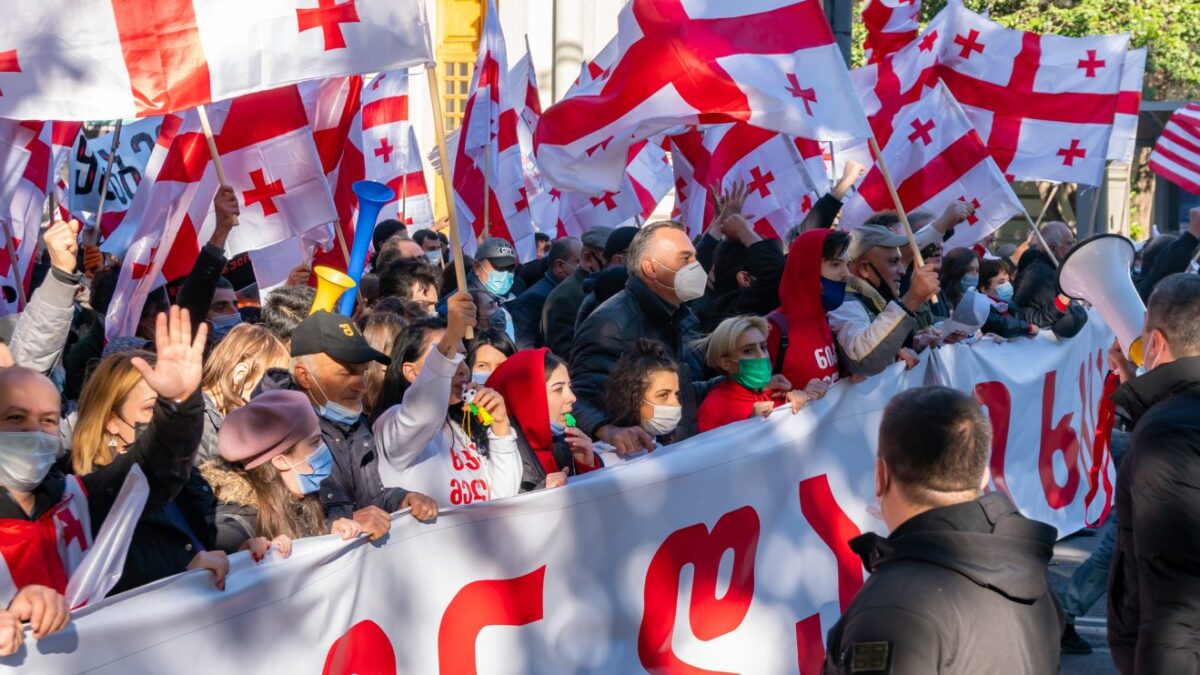Democracy and freedom are slipping away in Georgia. Sanctioning the Georgian Dream party leaders will show the European Union is consistent in protecting its values, especially when it comes to candidate countries.
Such a measure would likely give Georgian street protesters the impetus to continue their fight for a Euro-Atlantic Georgia, especially at a time when law enforcement is intimidating Georgian citizens who protest peacefully, even arresting some of them.
Other non-democratic acts the pro-Russian Georgian Dream ruling party has enforced lately include the annulment of the mandates for 49 MPs from opposition parties for creating a ‘healthy opposition’ group, as well as planning new laws targeting media and civil society organisations.
These policies are likely to contribute to the further shrinking of the civic space, continuing the autocratic line inspired by the foreign agents law which triggered massive protests in Tbilisi last year and determined the EU to cut funding for Georgia. But cutting back the funding only impacted the ordinary citizens of Georgia and produced little to no effect in regards to the government, which has become even more violent towards citizens.
The EU would not be the first entity to sanction the leaders of the Georgian Dream party. The Biden administration sanctioned its founder and honorary chairman, Bidzina Ivanishvili, in December 2024. So far the new administration led by Donald Trump has yet to reverse this policy.
Moreover, one of the biggest supporters of the pro-Euro-Atlantic cause of Georgia in Washington is Joe Wilson, a Republican congressman and Chairman of the US Helsinki Commission. He invited the fifth president of Georgia, pro-EU Salome Zourabichvili, to the inauguration of Donald Trump, and initiated a joint statement of the International Friends of Georgia Group, calling for new free and fair elections and the non-recognition of the Georgian Dream-led government.
The EU’s muted response
Even though Georgia is in its own backyard, the EU’s response to the situation in Georgia has been muted, with no sanctions to demonstrate support from European leaders with the Georgian population, which is strongly pro-EU. Preoccupied with their own internal problems, European leaders seem to be missing a new opportunity for geopolitical assertiveness, leaving Georgia captive to Russian influence and Chinese interest in its critical infrastructure.
This passivity is all the more inexplicable as Georgia’s population is among the most pro-EU nations in the European Union’s neighbourhood: in 2024, six out of 10 Georgians had a positive image of the EU, and 81 per cent of the citizens surveyed would vote for EU integration if a referendum were held on the issue.
The EU’s strategy to manage the crisis in Georgia should include sanctioning government leaders, especially those directly responsible for abuses against civil society and the democratic opposition, and progressively continue with asset freezes for oligarchs in the Georgian Dream entourage.
At the same time, the European Union should find support mechanisms to strengthen Georgian civil society, provide visas for journalists and activists who make known the abuses of the regime, and increase the financial support given directly to non-governmental organisations.
A missed opportunity
If a new law promoted by Georgian Dream were to target the closure of civil society organisations and independent media trusts, the EU should act swiftly to host these organisations on its territory and financially support these media entities, so they can continue their activities.
More consistent EU support for Georgian civil society is all the more relevant in the context of the US decision to suspend USAID funds, which were crucial for democratic movements in countries like Georgia.
Georgian citizens expect a signal of support from the European Union, the community of values into which they wish to integrate. Unfortunately, while Georgian Dream leaders’ abuses of civil society are increasing, the EU’s response is overdue, demonstrating both value inconsistency and a missed opportunity to build a new geopolitical narrative of democracy support in the Eastern Neighbourhood.
Photo: Dreamstime.







